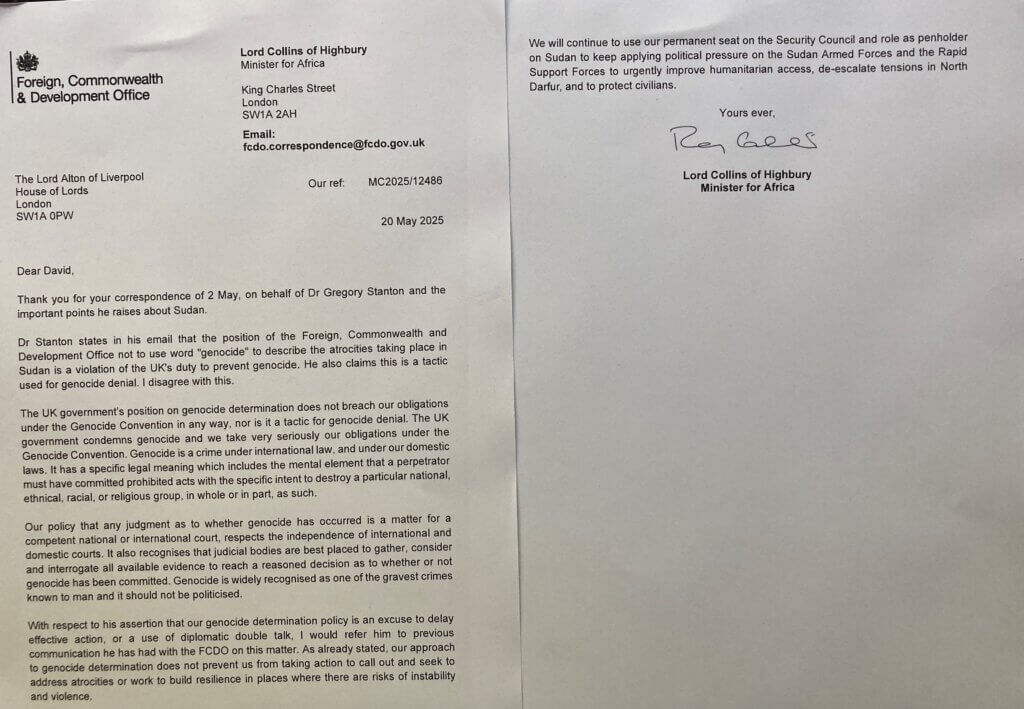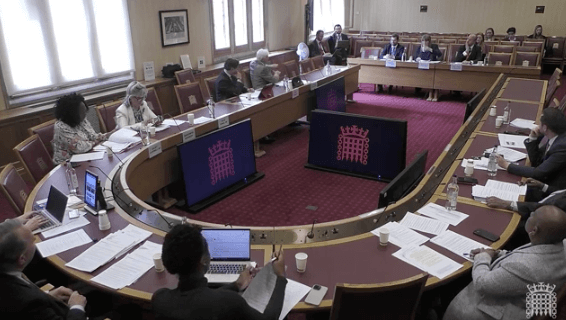Letter from Professor Gregory H. Stanton Founding President, Genocide Watch, Chair, The Alliance Against Genocide, rebutting the FCDO’s failed policy in dealing with the crime of Genocide.
Dear Lord Alton,
Thank you for forwarding the reply from Lord Collins to my letter to the UK Foreign Office.
It was obviously drafted by one of the lawyers who is committing legal malpractice at the Foreign Office by claiming that only a court can determine if a genocide is underway.
You will note the author’s confusion about the intent requirement to prove genocide:
The writer says:
“Genocide is a crime under international law, and under our domestic laws.
It has a specific legal meaning which includes the mental element that a perpetrator must have committed prohibited acts with the specific intent to destroy a particular
national, ethnical, racial, or religious group, in whole or in part, as such.”
There are two legal errors in that statement:
The writer says the intent must include a “mental element.”
Perhaps the intent of an individual can be called a “mental” element, though it would more accurately be described as the individual’s will.
But states do not have minds.
State intent is proven by a systematic pattern of acts to destroy a group, in whole or in part.
This is not a “mental” element.
The Foreign Office confuses proof of intent by an individual with proof of state intent.
Second, the writer’s reference to “specific intent” is not present in the Genocide Convention.
All the Convention requires is the “intent” to destroy a group in whole or in part.
When the Convention was written, there was no discussion of “specific” intent.
In fact, intent in the travaux that produced the Genocide Convention is simply intent with the ordinary meaning of the term.
“Specific” is a term added by legal scholars like Schabas, who would like to limit the applicability of the Convention.
In his treatise, for example, Schabas claims that “ethnic cleansing” can never be “genocide” because it lacks the “specific intent” to destroy a group.
The ICJ followed Schabas in its erroneous decisions in Bosnia v Serbia and Croatia v Serbia.
The ICJ held in both cases that Serbia had the intent to “ethnically cleanse” Bosnia and Croatia, but not the “specific intent” to commit genocide.
The ICJ held that to conclusively prove genocide, destruction of a group must be the ONLY intent.
The ICJ blindly followed Schabas’ misinterpretation of the intent requirement.
The ICJ’s ONLY INTENT test is like saying that if a robber holds up someone with a gun and shoots and kills him, the robber cannot be tried for murder because he also had the intent to rob his victim.
Schabas has never been a prosecutor, so he does not recognize that both individuals and states nearly always have more than one intent for their actions.
In fact, a defendant can be charged with two crimes for the same actions.
The result of Schabas’ stunted concept of intent is that Schabas is a blatant genocide denier.
He denies that the mass murders in Cambodia (Vietnamese), Bangladesh (Bengalis), Serbia (Bosniaks), Ukraine (the Holodomor), and China (Uyghurs) constituted genocide.
The main points of my letter to the Foreign Office remain unanswered in Lord Collins’ reply:
1. By waiting for a court to declare that a genocide is underway, the UK will only use the G-word if a court has been presented with a case and decided there was a genocide.
Courts normally try genocide cases only after a genocide is over, perpetrators are captured, and victims can testify.
That is always too late to prevent a genocide.
2. Refusal to use the word “genocide” is a form of genocide denial because it is a refusal to accurately name the crime that is being committed.
It is like calling murder “violence.”
It doesn’t name the crime. So it doesn’t notify police or states what must be done to prevent it.
We have proven in careful word counts that as long as massacres are called “ethnic cleansing,” states will take no forceful action to stop them.
Forceful armed preventive action will only be taken when “Genocide” (the G word) becomes the dominant term in newspapers and television, and statements by governments, human rights groups, and the UN.
See: https://www.genocidewatch.com/single-post/ethnic-cleansing-is-a-euphemism-used-for-genocide-denial-1 and
https://www.genocidewatch.com/_files/ugd/d0bbf9_1b538d9eaff647c68763cafad03beb9a.pdf and
https://www.genocidewatch.com/_files/ugd/d0bbf9_203c9cb96c9645e6b297633381d0025c.pdf
All the UK has done about the genocide in Sudan is to call an expensive “high level” conference in London that resulted in many platitudious speeches, some pledges of money, and no action.
As “pen-holder” on Sudan, the UK has also sponsored several toothless UN Security Council resolutions urging member states to donate more humanitarian assistance.
These resolutions were used to block introduction by other Security Council members of alternative UNSC resolutions that would have sent 10,000 AU troops and 715 police into Sudan to directly protect civilians and defeat the Rapid Support Forces.
The “statements of concern” by the Foreign Office about the “catastrophic situation” in Sudan accomplish absolutely nothing.
In fact they are worse than nothing.
Because they are designed to make the public think that the British government cares.
In fact the government of the UK doesn’t care at all.
Respectfully,
Dr. Gregory H. Stanton
Founding President, Genocide Watch
Chair, The Alliance Against Genocide
1-703-448-6665
Never take credit.
Do nothing negative.
PLEASE SHARE THIS LETTER WITH THE FOREIGN OFFICE AND PLACE IT IN THE RECORDS OF THE PARLIAMENT



